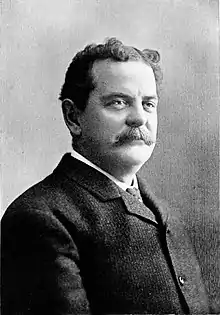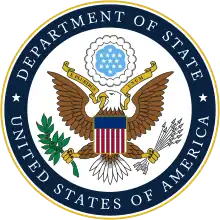Charles Spencer Francis | |
|---|---|
 Francis, circa 1901 | |
| United States Ambassador to Austria | |
| In office May 29, 1906 – April 1, 1910 | |
| President | Theodore Roosevelt William Howard Taft |
| Preceded by | Bellamy Storer |
| Succeeded by | Richard C. Kerens |
| United States Minister to Romania | |
| In office October 16, 1901 – December 24, 1902 | |
| President | Theodore Roosevelt |
| Preceded by | Arthur Sherburne Hardy |
| Succeeded by | John B. Jackson |
| United States Minister to Serbia | |
| In office May 13, 1901 – December 24, 1902 | |
| President | William McKinley Theodore Roosevelt |
| Preceded by | Arthur Sherburne Hardy |
| Succeeded by | John B. Jackson |
| United States Minister to Greece | |
| In office March 2, 1901 – December 24, 1902 | |
| President | William McKinley Theodore Roosevelt |
| Preceded by | Arthur Sherburne Hardy |
| Succeeded by | John B. Jackson |
| Personal details | |
| Born | June 17, 1853 Troy, New York, U.S. |
| Died | December 1, 1911 (aged 58) Troy, New York, U.S. |
| Resting place | Oakwood Cemetery 42°45′50″N 73°39′59″W / 42.76389°N 73.66639°W |
| Political party | Republican |
| Spouse |
Alice Evans (m. 1878) |
| Parents |
|
| Alma mater | Cornell University (B.S.) |
| Occupation | Newspaper editor, diplomat |
| Military service | |
| Allegiance | |
| Branch/service | New York State National Guard |
| Rank | Colonel |
Charles Spencer Francis (June 17, 1853 – December 1, 1911) was an American diplomat and newspaper editor.
Early life and education
The son of diplomat and newspaper publisher John M. Francis and Harriet E. Tucker,[1] Charles Spencer Francis was born on June 17, 1853.[2] He studied at Cornell University from 1870 to 1871,[3] before joining his father in Greece as his secretary.[4] His mission completed, Francis thus returned to the United States and Cornell in 1874.[3]
At Cornell, Francis proved to be an excellent rower, setting the world record in intercollegiate single scull competition in 1876 (which stood long after his death, up until his grandson also attended Cornell).[5] He graduated from Cornell the next year with a Bachelor of Science degree.[3]
Newspaperman
He went to work for his father's newspaper, The Troy Times, as a reporter,[2] and worked his way up to the editor's desk. He bought a stake in the paper, then made it an equal one. Upon his father's death in 1897, Francis took over the paper entirely.[6]
Diplomatic career
Francis, a Republican,[1] was appointed to his father's old post of United States Minister to Greece, Serbia, and Romania in 1900, under President William McKinley.[4] Two years later, Francis resigned to attend to his newspaper and other business interests.[7]
He returned to diplomacy in 1906, when President Theodore Roosevelt nominated Francis to another of his father's old posts: that of the United States Ambassador to Austria—at the time, the United States Ambassador to Austria-Hungary;[6] upon the recall of Bellamy Storer. The Emperor, Franz Joseph, accepted; and his appointment was announced by the Foreign Ministry on March 28, 1906.[8] Two months later, Francis presented his credentials.
He was officially introduced to the Emperor's court on January 30, 1907.[9] Three years later, on the eve of his departure, the Emperor received him in a farewell audience.[10]
He was replaced by Richard C. Kerens.[11]
Other activities
A member of Zeta Psi, he served in the New York State National Guard under Joseph Bradford Carr, ultimately attaining the rank of colonel.[12] He was also a vice president of the American Scenic and Historic Preservation Society,[4] and a member of Sons of the Revolution.[3]
In 1903, Francis became a member of the Board of Regents of the University of the State of New York,[6] which he resigned upon his nomination as ambassador.[1]
Personal life
Francis married Alice Evans, the daughter of a Cornell professor,[4] on May 23, 1878;[1] and they had five children, two sons and three daughters.[13]
Francis died from myocarditis on December 1, 1911,[3] and was buried at Oakwood Cemetery.[13]
References
- 1 2 3 4 John William Leonard (1907). Men of America: A Biographical Dictionary of Contemporaries. L. R. Hamersly. pp. 908–909.
- 1 2 "To Represent US Abroad". New-York Tribune. December 30, 1900. p. 14. Retrieved March 8, 2020.
- 1 2 3 4 5 "Obituary: Charles S. Francis, '77". Cornell Alumni News. Vol. 14, no. 10. Ithaca, New York. December 6, 1911. p. 111. Retrieved March 8, 2020.
- 1 2 3 4 "CHARLES S. FRANCIS DEAD.; Ex-Ambassador to Austria-Hungary and Owner of The Troy Times". The New York Times. December 2, 1911. ISSN 0362-4331. Retrieved March 8, 2020.
- ↑ "3 GENERATIONS BLEND IN CORNELL OARSMAN; John M. Francis Jr., a Freshman, Follows in Steps of Father and Grandfather". The New York Times. May 18, 1924. ISSN 0362-4331. Retrieved March 8, 2020.
- 1 2 3 "A New Ambassador". New-York Tribune. March 20, 1906. p. 3. Retrieved March 8, 2020.
- ↑ "DIPLOMATIC CORPS CHANGES.; H. L. Wilson, Minister to Chile, Succeeds Charles S. Francis as Minister to Greece -- Others Promoted". The New York Times. October 15, 1902. ISSN 0362-4331. Retrieved March 8, 2020.
- ↑ "Mr. Storer's Recall". New-York Tribune. March 28, 1906. p. 4. Retrieved March 8, 2020.
- ↑ "Court Reception for Francis". Democrat and Chronicle. January 31, 1907. p. 10. Retrieved March 8, 2020.
- ↑ "Francis leaving Austria". Buffalo Morning Express and Illustrated Buffalo Express. April 2, 1910. p. 12. Retrieved March 8, 2020.
- ↑ "KERENS FOR AMBASSADOR.; Will Probably Be Appointed to the Embassy at Vienna". The New York Times. November 27, 1909. ISSN 0362-4331. Retrieved March 8, 2020.
- ↑ "Colonel Charles S. Francis" (PDF). Cornell Alumni News. Vol. 3, no. 15. January 9, 1901. p. 1. Retrieved March 8, 2020.
- 1 2 "Newspaper Proprietor and Diplomat is Summoned to the Great Beyond". The Post-Star. December 2, 1911. p. 1. Retrieved March 8, 2020.
